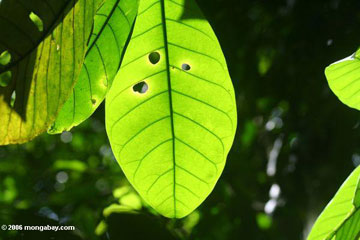Global warming to stunt growth of rainforest trees
Global warming to stunt growth of rainforest trees
Rhett A. Butler, mongabay.com
August 12, 2007
Global warming could reduce the growth rates of rainforest trees by 50 percent, reported research presented last week at the annual meeting of the Ecological Society of America in San Jose, California by Ken Feeley of Harvard University’s Arnold Arboretum in Boston.
The study, published in April this year in Ecology Letters, found that tree growth rates in 50-hectare forest plots in Panama and Malaysia have decreased dramatically for the majority of species in two lowland tropical forests over the past couple of decades. The results contradict the hypothesis that elevated atmospheric carbon dioxide levels would boost growth rates of trees in the tropics by speeding plant respiration.

Slowing growth of tropical trees could complicate efforts to fight global warming through tropical reforestation and conservation |
“I was surprised at the magnitude and at how widespread it was,” Feeley told the Harvard Gazette in April 2007. “In Malaysia almost every single species was declining in growth. It is very rare that you find anything in these forests consistent across 800 species.”
The findings have implications for global warming mitigation schemes that rely on the planting of trees in the tropics to sequester carbon emissions. Such reforestation initiatives, which promise to conserve biodiversity while helping to fight climate change, have enjoyed wide support from scientists, international development agencies, and governments over the past year.
Since higher temperatures may lead trees to absorb carbon at lower rates, the research suggests that sequestration initiatives would need to conserve and plant larger areas of tropical forest than previously expected to offset rising emissions.
Read earlier and more extensive coverage of this story: Higher temperatures slow tropical tree growth, global warming mitigation







